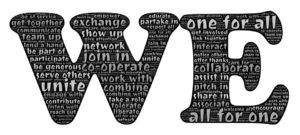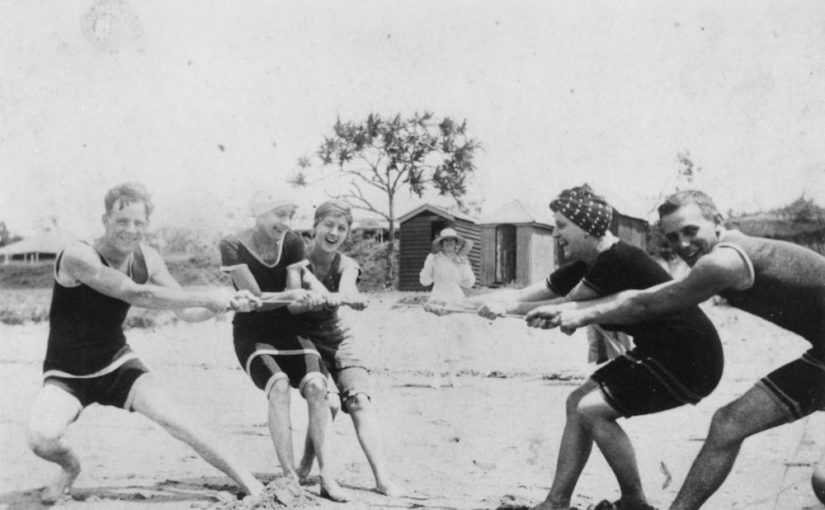One of the most powerful words in the English language has only two letters–“we.” Unfortunately, most leaders use it completely wrong.
Humans think socially
One of the most basic facts of human psychology (and public speaking) is that humans view the world through glasses tainted by their own social identity.
In other words, whenever you interact with another human begin, you don’t interpret the experience just as 2 individuals. You also interpret every experience based on what groups you belong to.
The important thing to remember is that no matter who you are speaking to, their brain has subconsciously placed you into a group before you even open your mouth. Studies have shown that the human brain places a stereotypical label on you in less than 100-200 milliseconds!
 Good presentation skills have to overcome that bias.
Good presentation skills have to overcome that bias.
For example, what do you picture when I quote Republican leader Newt Gingrich?
They [the Democrats] think it is their job to run the plantation.
The way you interpret that statement has everything to do not just with Newt Gingrich, but whether or not you consider yourself a member of his “Republican” party.
But let’s not forget what Hillary Clinton said:
They [the Republicans] are running the House of Representatives like the plantation.
Does the reference to the “plantation” mean the same thing when a Democrat says it? It depends on whether or not you consider yourself a member of her “Democrat” party.
Pronouns Identify Groups
 Two politicians say virtually the same thing, the only difference is what the pronoun “they” means.
Two politicians say virtually the same thing, the only difference is what the pronoun “they” means.
I know we all want to believe that we are logical, modern, enlightened human beings, but the psychological truth is that we interpret everything through our social identity glasses.
Everything we hear is interpreted through a filter of “us” versus “them.” If you want me to agree with you, you have to be one of “us.”
If you are one of “them,” I will subconsciously twist your words to mean something I cannot agree with.
Have you ever listened to a speaker and rejected his argument within the first few sentences? It had nothing to do with the argument. It had to do with the speaker’s instant ability to make you feel like you were on a different team.
Pronouns are ambiguous
Did you ever have someone talk to you about “them there those things?”
Just this morning my wife was telling me about that thing. Apparently he didn’t want this, or they needed us to have it … or something. Confused? I didn’t know what she was talking about either.
I didn’t know which who did what with this, that, or the other of it, because my wife loves to speak in pronouns.
She knows who “he” is. She know what “that” means. She knows where “there” goes. But when the speaker doesn’t make it clear, the listener interprets it through his/her own social identity perspective.
Pronouns are ambiguous. In any communication, but especially in public speaking, when the audience doesn’t have the opportunity to ask for clarification, pronouns are dangerous.
That is why the most dangerous pronoun of all is a wee-little bitty, two-letter, pervasive utterance–“we.”
The “We” little pronoun
Nearly every executive, salesperson or public speaker I’ve ever coached walks into a meeting and says something like this:
We want to help you …
I’m sorry, but when you use pronouns like that, you build yourself a “we”-little plantation.
 When you say to me a phrase like “we want to help you,” you are highlighting the fact that “you” (me) is not “we” (you) — and implying that your “we” is better than my “we.”
When you say to me a phrase like “we want to help you,” you are highlighting the fact that “you” (me) is not “we” (you) — and implying that your “we” is better than my “we.”
No matter what group you identify with, whoever that “us” includes for you, “us” is always better than “them.” Otherwise, you would leave “us” and join “them”–and then “them” would become your new “us.”
Is that really much different from hauling from my chubby, white butt up to the plantation and declaring “We’re here to help you people!”?
Them there, that’s bad presentation skills.
The problem is that almost all leaders use the word “we” to refer to their own company, their own executive team, or their own exclusive, privileged group of “us.”
If the listener is not part of that group, from the listener’s perspective, you sound like an unfamiliar, unworthy, unholy member of “them.”
Get off the plantation
I must admit that frequently in some cultures and even in the United States, occasionally, the power team is supposed to be on a privileged pedestal and the commoners expect to be treated as underlings.
However, in the United States, this is not the dominant culture. In the United States, try not to use the word “we” unless you are using the inclusive form.”
On the plantation, “we” the smart company wants to help “you” the disadvantaged company.
On the plantation, “we” the executives set the goals for “you” the employees.
On the plantation, “we” the seller knows more than “you” the buyer.
OFF the plantation, “we” are both smart companies.
OFF the plantation, “we” are not executives and employees, but members of the company team.
OFF the plantation, “we” are not buyer and seller, but collaborators trying to solve a common problem.
OFF the plantation, “you” and “I” are on the same “we”-team .
The inclusive form of “we” includes both the speaker and the listener.
Presentation Skills with Pronouns
 Video yourself giving a presentation or pull out the written text of your last speech. Highlight every time you used any form of the words “we,” “us,” or “our.”
Video yourself giving a presentation or pull out the written text of your last speech. Highlight every time you used any form of the words “we,” “us,” or “our.”
Then cross out the word every time that it refers to a group that does not include the intended audience.
I bet you will be shocked at how exclusive your words are!
It’s not always possible, but try rewording each of those sentences using “we” in a way that includes the audience.
To succeed you have to find something you have in common with the listener and create a group of “us” based around that commonality. This is the fundamental principle behind the orange “Develop Relationships” principle in my SpeechDeck communication system.
“Us” should include everybody in the room, “You” and “I” should be interchangeable with “we,” and “ours” should be something we hold in common.
Psychologically, it’s always “us” versus “them,” but if “us” doesn’t include everybody in the room, or if “them” IS in the room, you’re doing it wrong.
That’s the “we”-little secret most leaders never learned: If you want “me” to follow “you,” you have to make your “we” inclusive of my “we.”

